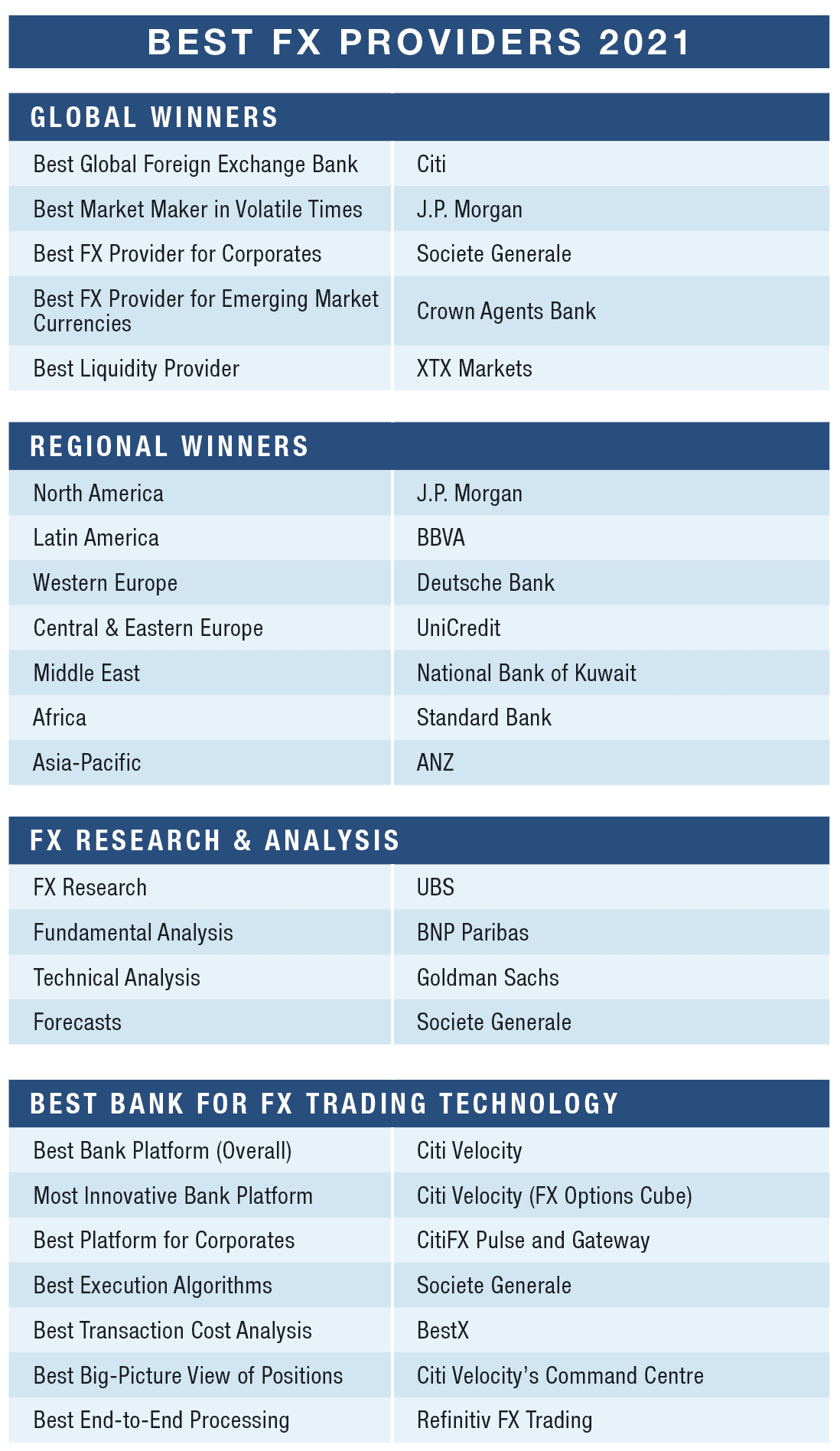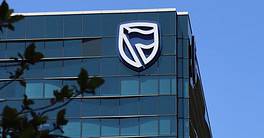Top-performing FX teams are demanding better analytics and integration, leveraging new tools of automation, data and artificial intelligence. In 2021, the best FX banks are delivering with digital innovation.

Many will no doubt be glad to see the back of 2020, specifically foreign exchange (FX) traders who’ve had a rough ride this year with Brexit, the coronavirus pandemic, double-dip recessions and the US elections, all taking their toll on currency markets.
Hopes of a V-shaped economic recovery were quickly dashed in those markets that were most impacted by Covid-19, who found themselves in recession territory, with Europe and the UK faring particularly badly.
US president Donald Trump’s refusal to accept the results of the national election and the rising number of Covid-19 cases there continue to result in bearish sentiment for the US dollar. At the time of writing, ongoing Brexit negotiations continue to drag the pound down against the euro.
Of course the impact of the pandemic on FX markets was not limited just to volatility in prices and exchange rate movements. Liquidity availability is always challenging during such unprecedented times and the shift to working from home upended normal corporate workflows when it comes to trading FX.
“The good news is that the market structure was flexible enough to accommodate rapid changes in execution methodologies and other areas, allowing market participants to adapt on the fly,” states Ken Monahan, senior analyst for Greenwich Associates Market Structure and Technology and author of the research paper Ad Hoc Responses to COVID Shock Will Continue to Shape FX Market Structure.
A Greenwich Associates study of FX market participants found that relationships had become more important for more than 60% of participants during the Covid-19 crisis, which Monahan says caused a sudden plunge in liquidity across the entire FX ecosystem.
“FX market participants are going to remember for a very long time how they were treated in the crisis—who stood up for them and who did not,” Monahan says. “That reliance on the support of human counterparties is illustrated by the fact that—in what is probably the most electrified market on earth—about one in five FX market participants increased their use of voice trading during the crisis.”
While the human touch remains important in the $6.6 trillion a day FX market, almost a quarter of participants in Greenwich’s survey increased their use of trading algorithms (algos) during the pandemic, and an even bigger percentage plan to step up their use of algos in future. Monahan contends that will put new pressures on FX trading venues to reduce costs and enhance performance—similar to what has already happened in equity markets. Algos allow traders to reduce market impact and shop their orders around multiple liquidity pools.
According to the Bank for International Settlement’s 2019 Triennial Survey on FX and OTC markets, FX trades that were executed electronically instead of traditional voice trades, had edged up only slightly (a 2% percentage point increase to 58%). In last year’s survey, spot FX transactions (75%) were the most electronically traded instrument, with the pace of automation also accelerating in forwards and non-deliverable forwards.
In this, our 21st annual Foreign Exchange Awards, Global Finance honors corporate and financial institution winners in 113 countries and seven global regions, as well as the best banks for FX research and analysis and for FX trading technology. They are the banks and technology providers that have demonstrated their commitment to FX, even in challenging market conditions, and who have rolled out digital tools to help participants execute their trading strategies and achieve price discovery more effortlessly.
Awards Methodology
Global Finance selects its award winners based on objective factors such as transaction volume, market share, competitive pricing and global coverage, as detailed in public company documents and media reports.
Our criteria also include subjective factors such as customer service and technology innovations, using input from industry analysts, surveys, corporate executives, consultants and technology experts. Although entries are not required in order to win, our decision-making is informed by submissions that provide additional insight.
BEST GLOBAL FOREIGN EXCHANGE BANK
Citi
With a presence in some 100 countries, Citi provides electronic foreign exchange (FX) pricing locally across more than 85, primarily through its CitiFX Pulse platform for corporate traders.
Citi engineered the integration of its electronic FX solutions with the back end of clients’ enterprise resouce planning (ERP) and treasury management systems such that FX trade execution is fully automated from end to end. Its single-dealer FX platform, Citi Velocity, which is used by institutional investors, provides access to liquidity in more than 100 currencies. Greenwich Associates rates Citi “top of the field” for electronic trading, which accounts for 80% of its global FX trading volume.
BEST MARKET MAKER IN VOLATILE TIMES
J. P. Morgan
Ranked by trading volume, J.P. Morgan, together with Citi, has distanced itself from other major dealers in the $6.6 trillion-a-day global FX business, according to Greenwich Associates. The combined impact of the global coronavirus pandemic, Brexit in the UK, continued turmoil over the US election, international trade tensions and recession risks in the US and the UK, have helped cement the two dominant banks’ advantage by making 2020 a more challenging year for FX traders. At such times, liquidity is paramount; and as a leading provider of electronic FX trading services, Morgan consistently demonstrates its resilience and commitment to the market. Last April, the fourth generation of its electronic FX pricing engine, which speeds up trade execution and global price discovery, went live in Asia, where Morgan saw increased trade flows in the early stages of the pandemic.
BEST FX PROVIDER FOR CORPORATES
Société Générale
The French bank provides corporate clients and financial institutions with a wide range of trading options: spots, forwards, non-deliverable forwards (NDFs) swaps and options for both mainstream and exotic currencies. Lately, Société Générale invested in cutting-edge algorithmic best execution and hedging strategies that incorporate artificial intelligence (AI) and machine learning. The bank boasts a large footprint in Western Europe and is a leading provider in the main G10 currencies as well as the Singapore dollar and emerging currencies such as the Chinese yuan and Mexican peso.
BEST FX PROVIDER FOR EMERGING MARKET CURRENCIES
Crown Agents Bank
UK-based Crown Agents Bank was established in the late 1700s to move money across developing, emerging and frontier markets. Its strength lies in providing pricing and settlement services in illiquid frontier-market currencies. Crown Agents’ single-dealer EMpowerFX platform offers access to more than 100 emerging and developed market currencies, supporting trading across more than 400 currency pairs. Through EMpowerFX, the bank aims to make emerging currencies more accessible and give international clients a faster and more cost-effective way to do business with developing, emerging and frontier markets.
BEST LIQUIDITY PROVIDER
XTX Markets
UK-based nonbank XTX is growing its slice of the FX liquidity pie in electronic spots and forwards. Its raison d’être is to use technology to deliver the transparency and analytics needed to help clients make better-informed liquidity decisions. For example, its recently launched FX Execution Algo, based on XTX’s knowledge as a leading FX market-maker, gives buy-side traders greater visibility over how their orders are executed.
BEST BANK IN NORTH AMERICA
J. P. Morgan
In volatile and uncertain times, pricing transparency, best execution and liquidity availability are essential to participants in the global FX market. As the FX trading firm with the largest worldwide market share—approximately 11%, according to market-data portal Statista—J.P. Morgan is known for its ongoing investment in electronic trading platforms as well as the service it provides across more traditional methods of trading.
BEST BANK IN LATIN AMERICA
BBVA
Describing itself as the digital bank of the 21st century, BBVA has set the pace in the region for FX digitization. Filling the gap left by other global banks that withdrew from Latin America in 2016 when some major LatAm currencies went into freefall, BBVA has spent the past few years championing digital technologies, providing clients with greater levels of automation and pricing transparency around FX. For corporate clients, the bank’s application program interfact (API) allows treasurers to directly access banking services from within their ERP system.
BEST BANK IN WESTERN EUROPE
Deutsche Bank
As of last June, Deutsche Bank’s total market share of FX trading services was more than 7%, putting it in fourth place behind J.P. Morgan, UBS and XTX Markets, according to Statista. Historically, Deutsche has set the pace for innovation in the FX market, for example with the launch of online FX trading in 2006. Last year, its Autobahn FX platform launched a mobile version that traders can access via their smartphones. While the bank is undergoing a major restructuring in response to a series of internal crises, at one of its most successful businesses, FX looks set to benefit from continued investment.
“In foreign exchange, we plan to continue to develop technology to maintain our competitive edge and build out our FX partnership with the corporate bank,” Deutsche Bank stated in its 2019 annual report.
BEST BANK IN CENTRAL AND EASTERN EUROPE
Unicredit
Central and Eastern Europe has always been an important growth engine for UniCredit, which is ranked as one of the largest banks in the region by total assets. Its CEE business, which spans 11 countries, accounts for more than 20% of the bank’s total revenues. With its continentwide strategic footprint, UniCredit is a major clearing bank for the euro and CEE currencies like the Hungarian forint, the Russian rubble and the Czech koruna. Its proprietary electronic trading platform, UC Trader, is designed to make trading multiple currencies and currency pairs more effortless and transparent.www.rbinternational.com
BEST BANK IN THE MIDDLE EAST
National Bank of Kuwait
NBK, including its Shariah-compliant bank, Boubyan, is a dominant player in Kuwaiti banking and has a well-established geographical footprint across the Middle East and North Africa. Its substantial balance sheet and financial strength enable it to support large-ticket FX deals. With digital platforms proving their ability to deliver greater transparency and best execution to FX traders, NBK has laid out an ambitious digitization road map, including a mobile-only offering and collaboration with third parties like fintechs to cement its leadership in the region. As part of its digital strategy, the bank is integrating its FX, money market and capital markets businesses on a new trading and risk management platform, affording customers an extended product offering and better hedging solutions.
BEST BANK IN AFRICA
Standard Bank
With operations in 20 countries across the continent, Standard Bank runs sizable FX transaction portfolios in each of these markets and its in-depth market knowledge helps keep clients abreast of regulatory changes that could impact their FX positions. Standard Bank is also well positioned to support corporate clients’ currency requirements in growing trade corridors, such as with China. It is leveraging digital technologies like blockchain to deliver cross-border payments with embedded FX—a solution that offers both FX conversions and cross-border payments functionality—and uses robotic process automation to speed up settlement in FX and money markets.
BEST BANK IN Asia Pacific
ANZ
The Australian-headquartered bank has a strong order book in both the Aussie and New Zealand dollar as well as G10 and Asian emerging currencies, enabling it to offer market-making capabilities across Asian nondeliverable forwards and deliverable currencies, providing simultaneous FX hedging and hedge unwinding. It is also one of only a handful of non-Chinese banks that can provide market-making in Australian dollar and Chinese yuan conversion. The bank boasts trading desks in Wellington, Sydney, Tokyo, Hong Kong and Singapore. It has also built a strong algorithmic trading offering for institutional FX trading.
FX RESEARCH
UBS
As part of its UBS Neo cross-asset platform, the Swiss bank gives customers access to a wide range of research pertaining to multiple asset classes, including FX. Users can access central repositories of responses to user questions as well as commentary from UBS’ sales and trading experts in a range of formats, including video and podcasts.
FUNDAMENTAL ANALYSIS
BNP Paribas
BNP Paribas provides FX analysis to customers including weekly FX key themes and quantitative analysis that projects how key rates are likely to move based on economic fundamentals. Last September, the French bank launched Insight LIVE, a real-time market intelligence portal and the FX industry’s “first real-time digital trading assistant.” ALiXits digital trading assistant, uses AI to provide “a running commentary on execution and trading, important events like data announcements, market moves or changes in liquidity.”
TECHNICAL ANALYSIS
Goldman Sachs
As of last June, Deutsche Bank’s total market share of FX trading services was more than 7%, putting it in fourth place behind J.P. Morgan, UBS and XTX Markets, according to Statista. Historically, Deutsche has set the pace for innovation in the FX market, for example with the launch of online FX trading in 2006. Last year, its Autobahn FX platform launched a mobile version that traders can access via their smartphones. While the bank is undergoing a major restructuring in response to a series of internal crises, at one of its most successful businesses, FX looks set to benefit from continued investment.
“In foreign exchange, we plan to continue to develop technology to maintain our competitive edge and build out our FX partnership with the corporate bank,” Deutsche Bank stated in its 2019 annual report.
FORECASTS
Société Générale
Throughout the pandemic year, Société Générale has established a strong track record with its predictions regarding movements in major currencies like the US dollar, sterling and the euro as well as emerging market currencies. It charted the dollar’s “fall from grace” over the summer and lowered its outlook for the euro early in the crisis. With coverage of the G10 and emerging market currencies, its forecasts are widely cited.
BEST BLANK PLATFORM (OVERALL)
Citi Velocity
With 12 patents under its belt, Citi Velocity benefits from ongoing investment and upgrades. By emphasizing remote access during the pandemic, Citi has ensured that both desktop and mobile versions of Velocity provide a consistent user experience for customers executing trades or complex order strategies. The ability to configure different algorithmic trading strategies, create basket orders and sync orders placed via the mobile version in real time are welcome additions.
MOST INNOVATIVE BANK PLATFORM
Citi Velocity (FX Options Cube)
Citi says the design of its trading platform benefits from the constant feedback it receives from clients. One of its newest features is the ability to launch order execution strategies with a simple click, via Velocity’s Launchpad order execution dashboard. Launchpad is a more easily configurable user interface, which makes execution and managment of multiple trades nearly effortless. The feature is designed to be seamless across both desktop and mobile devices.
BEST PLATFORM FOR CORPORATES
CitiFX Pulse and Gateway
Corporate users of CitiFX Pulse benefit from an electronic engine that prices locally in a multitude of currencies and tightly integrates with clients’ workflow. For treasurers operating across multiple currencies and jurisdictions, CitiFX Pulse takes care of all the regulatory nuances, ensuring FX trade execution is seamless and compliant. It also provides treasurers with tools to better analyze and understand their FX exposures.
BEST EXECUTION ALGORITHMS
Société Générale
With names like Nightjar, Société Générale’s execution algorithms for corporates and financial institutions are designed to minimize market impact and transaction costs. Trades that use its algorithms are anonymous, reducing signaling in the market. Keeping the details—the buy-side customer’s identity, transaction size and interest—hidden is key to ensuring that market-makers get the best price when executing large trades. SocGen’s algorithms can be tailored to suit traders’ specific requirements, pricing and execution strategies.
BEST TRANSACTION COST ANALYSIS
BestX
Transaction cost analysis is essential for buy-side firms looking to assess the effectiveness of specific trading strategies. While sell-side firms typically provide such a service, BestX stands out with its open architecture and its agnosticism with regard to execution venue and provider. Clients get both pre- and post-trade analytics to help them determine if they are achieving best execution. Since State Street acquired it in 2018, BestX has extended its transaction cost analysis tools to cover other instruments such as equities and fixed income
BEST BIG-PICTURE VIEW OF POSITIONS
Citi Velocity’s Command Centre
As FX trading and execution become more heavily regulated, Citi Velocity’s Command Centre offers administrators greater visibility, control and oversight of trades. Much like the controls in an airplane cockpit, the Command Centre dashboard allows administrators to easily break down information pertaining to specific traders and trading accounts: for example, whether a trader is logged in or on vacation and the number of access hours enabled for each. Clients can set individual permissions for both mobile and desktop applications, including IP addresses and mobile devices that can access Velocity.
BEST END-TO-END PROCESSING
Refinitiv FX Trading
From pre-trade through to execution, order routing and post-trade, Refinitiv FX Trading covers the lifecycle of an FX trade. It provides access to trading venues and liquidity across multiple currency pairs, execution management along with trade confirmations and settlement reports. Refinitiv’s FX market data and analytics enable traders to enhance their trading strategies for better price discovery.





